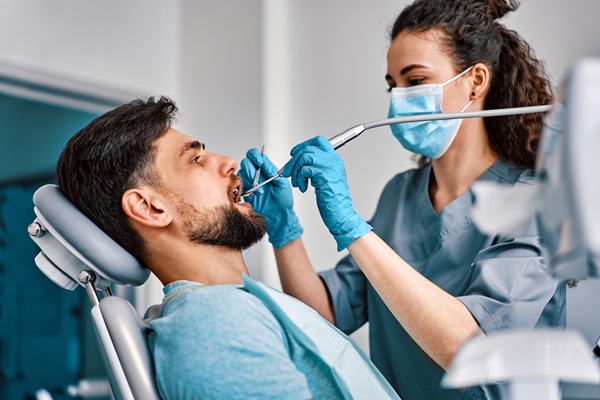What to Ask Your Dentist About a Dental Cleaning

A dental cleaning is the perfect opportunity to catch up with your dentist. Yes really, catch up. Your average dentist loves it when their patients have healthy teeth that need little more than a light scrub. This is why preventative measures like routine checkups are so important.
Patients with healthy teeth can spend the bulk of their dental visit receiving gems of wisdom from their dentist. Here are some questions to ask your dentist about dental cleaning and oral health.
The need for professional dental cleaning
It is always a good idea to start at the beginning: Why is professional teeth cleaning necessary if the patient takes excellent care of their teeth? Dentists answer this question by listing the different benefits of regular dental visits:
- Routine dental checks allow a dentist to monitor the health of their patient’s teeth, gums, and oral cavity
- Monitoring also includes screening for oral cancer at no extra cost to the patient
- Dentists also get to catch and correct small problems before they develop into larger, more expensive problems
- Deep cleaning of the teeth ensures that the patient is free from plaque buildup and tartar, which can cause gum disease
In a nutshell, dental cleaning is a preventative measure that pretty much ensures a lifetime of healthy teeth and gums. This translates into cost savings since the patient will have little need for restorative dentistry. The patient can now move on to other questions.
Does dental cleaning hurt?
Different individuals will have different experiences in the dentist’s chair. The person getting their teeth cleaned after a long while may experience some tooth sensitivity from scaling (plaque removal) and polishing. Also, people who rarely floss may experience a little bleeding that goes away after a short while.
There are ways to ensure a smooth process. For starters, the dentist may ask their patient to take an over-the-counter painkiller before and after the procedure. The dentist will also use a topical anesthetic to numb the patient’s teeth and gums. They will advise their patient to eat soft foods for one or two days after the deep clean.
How healthy is the patient’s mouth?
The dentist will always perform an in-depth exam as preparation for deep cleaning their patient’s teeth. They will share their findings with the patient. A breakdown of the patient’s oral health should include the state of the teeth and gums. The dentist should also tell their patient if they have abnormalities in the tongue, inner cheeks, oral cavity, throat, or neck.
Lastly, the dentist will point out problem areas that need improvement. They will also offer solutions to address these problem areas. Solutions may range from a change in oral habits to corrective dental procedures.
Find out how to keep your dental bills to a minimum
With regular dental cleaning, sharp dentist’s tools may never come near your mouth again. Sounds good, right? All it takes is good oral habits that include regular visits with our very pleasant dentist. Make teeth cleaning a regular thing and limit your dentist visits to a chat and a few minutes in the dentist’s chair.
Request an appointment here: https://www.jameslakedds.com or call James Lake, DDS at (760) 853-2144 for an appointment in our Yucca Valley office.
Check out what others are saying about our dental services on Yelp: Dental Cleaning in Yucca Valley, CA.
Related Posts
Dental restoration is key to the success and appearance of dental implants. After a dental implant is placed, you must select the appropriate restoration to complete the process and restore both the function and appearance of your smile. Various options are available, each with its benefits depending on your needs and the condition of your…
Do you think your wisdom teeth may need to be removed? Wisdom teeth extraction, whether complete or partial, is a standard procedure that comes by recommendation of a dentist. Sometimes, it could be because they were coming in crooked or placing too much strain on your jaw or neighboring teeth. If you have undergone a…
Dental bonding is a minimally invasive way to enhance or repair the smile. Whether the issue is staining or a minor crack, bonding can be a quick and effective way to address it. Learning more about this common dental service can help you determine whether it is the best option for restoring your smile. Dental bonding…
An implant dentist uses artificial tooth roots to anchor a restoration for a lost tooth or teeth. By replacing the lost tooth roots, dental implants provide you the strength and stability needed to chew food and perform other oral functions. Also, they help to stimulate and preserve jawbone structure, stopping bone loss, and maintaining facial…
